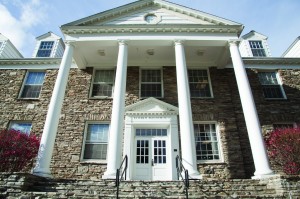Faced with an unbalanced budget and two years of low enrollment, President Mullen and Vice President of Academic Affairs, Dean Mills Woolsey, announced significant cuts in academics for the 2014-2015 academic year. The information was first announced to faculty and staff on Wednesday morning and then made publicly available on the Houghton website for alumni, students, and parents soon afterward.
“I resonate with the agony of this process,” said President Mullen referencing her own experience as an educator.
The cuts include program eliminations, faculty reductions and cuts, academic administration restructuring, deferred hiring, and significant curricular reorganization.
 The main aim of the recent budget decisions are to stabilize the economy of the college. According to Mills Woolsey, the college was forced to cut at least 10-15% of the academic budget due to several issues, the chief of which is declining enrollment — an issue that has plagued the college for the past two years. In addition to this, a deficit budget from last year, rising healthcare costs, the issue of faculty salaries, and added debt from the Kerr-Pegula fieldhouse also contributed to Houghton’s financial difficulties and prompted the cuts.
The main aim of the recent budget decisions are to stabilize the economy of the college. According to Mills Woolsey, the college was forced to cut at least 10-15% of the academic budget due to several issues, the chief of which is declining enrollment — an issue that has plagued the college for the past two years. In addition to this, a deficit budget from last year, rising healthcare costs, the issue of faculty salaries, and added debt from the Kerr-Pegula fieldhouse also contributed to Houghton’s financial difficulties and prompted the cuts.
Among the programs proposed to be eliminated are the French concentration and minor, the informational technology management major, the Islamic studies concentration and minor, the psycholinguistics concentration, and the visual studies major. The elimination of these programs was judged based on the level of appeal and student involvement. “We have a number of good programs,” said Mills Woolsey, “but some of them didn’t take off or appeal to students.” Students currently enrolled in any of the eliminated programs can expect to have a way to complete their work. Along with program eliminations, others, such as the Greatbatch School of Music, are being asked, in Mullen’s words, to “creatively scale-back” their methods of operation in order to help relieve the college budget.
Faculty will also be experiencing reductions and eliminations. The Dean hopes to speak to the faculty that have had their positions reduced or eliminated by November 15. In addition, though hiring will not be completely frozen, some key hires in sociology, finance, web media, and chemistry will be deferred. Many currently vacant positions and positions lost through attrition are also not expected to be filled in the near future.
Academic administration will also be changing as a result of the cuts. The Dean hopes to move the seven academic areas to four and reduce the 18 departments to 11 or 12. This is not expected to have much of an impact on students, though it will affect the faculty.
In the decision making process, the President and the Academic Dean were presented with the decision to declare financial exigency, a condition that could have made the options for cutting costs much simpler, but it was not a route that they thought was appropriate for Houghton’s current predicament. “We don’t want to do that because it says the wrong message,” said Mills Woolsey, “We’re not at the brink of financial disaster, although we’re at a really challenging spot.” Mills Woolsey continued to cite examples of sister Christian colleges who were able to turn their situations around without declaring financial exigency.
Mills Woolsey and Mullen remain hopeful and see these cuts as an opportunity for future growth. While the primary motivator of the cuts is to balance the budget for the next academic year, a secondary motivator is “also to use the moment of cutting to get ourselves in a good position to be a strong college to meet the needs of contemporary students,” said Mills Woolsey. The task will be painful, though, said Mullen, and it will certainly “require ongoing creativity and grit.”
